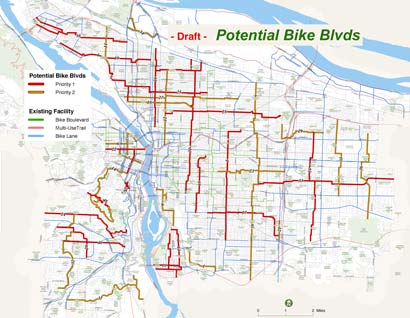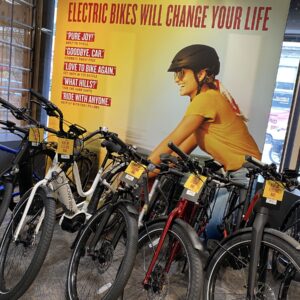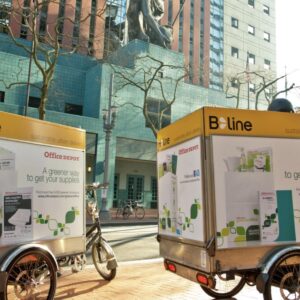
Portland City Commissioner and Mayor-elect Sam Adams hasn’t forgotten about the $24 million, 110-mile bicycle boulevard he tried to get funding for in his Safe, Sound and Green Streets proposal. That plan died back in July (after a swirl of political gamesmanship), but Adams now hopes funding for the bike boulevards will be included (along with $820 million in other projects) in a federal economic stimulus plan being worked on in Congress.
There is growing momentum for a public-works-based stimulus bill that would use transportation infrastructure projects as a catalyst for job creation and economic growth. President-elect Obama has voiced support for such an idea, as has House Speaker Nancy Pelosi — who was in Portland last month and spoke about it with Congressman Earl Blumenauer.
The City of Portland has identified eight categories of high-priority projects that total $847 million, and if fully funded, would produce an estimated 8,850 jobs.
According to sources close to the effort, the stimulus package will prioritize “shovel-ready” projects that are ready to begin immediately. One such project is Portland’s bike boulevard network. PDOT feels it qualifies as “shovel-ready” because it has been vetted by PDOT planners and the community (via a series of open houses during the Safe, Sound and Green Streets process).
This morning, the City of Portland and Senator Ron Wyden’s office held a press conference downtown to present their multi-agency proposal. Representatives from ODOT (Jason Tell), Multnomah County (Ted Wheeler), Metro, and others were on hand.
According to Shoshanah Oppenheim, transportation policy adviser for Adams, the agencies have put together a “coordinated, comprehensive package of very direct requests so that the Senators are prepared when they go back to Washington.”
Mayor-elect Adams spoke at the press conference and said that the City of Portland has identified eight categories of high-priority projects that total $847 million, and if fully funded, would produce an estimated 8,850 jobs.
Among the projects on the list (I’m still waiting on a detailed breakdown) are streetcar expansion, $65 million for paving and safety improvements, bridge repair, and the bike boulevard network.
Oppenheim told me via phone this morning that the eight paving projects would include Columbia Blvd., Cully Blvd., Hawthorne Blvd., Madison Ave., Front Ave., and others.
Speaking at the press conference this morning (according to a copy of his talking points I’ve received from his office), Adams stressed the importance of these paving projects, saying their are “critical to our transportation system” and that they could “break ground as soon as it is funded”.
Adams stressed that Madison is a “critical link to the Hawthorne Bridge for thousands of cyclists and vehicles” as well as a key bus route.
“If funded,” said Adams, “these projects could start in 4-6 months, producing more than 312 construction jobs that, in turn, hint at a revitalizing economy.”
The City of Portland has also requested that the money is doled out by local municipalities (instead of by the US DOT or ODOT). At the press conference this morning, Adams said that this would allow PDOT to “spend the money quickly, leverage multiple sources of funding effectively and gauge the pulse of community needs most accurately.”
Not surprisingly, Congressman Earl Blumenauer is spearheading much of this effort on Capitol Hill. I spoke to Blumenauer’s Advisor for Livable Communities Meeky Blizzard this morning. Blizzard said that the plan would not provide funding for specific projects (careful to avoid any semblance to “earmarks”), but rather that their office is working to shape the definition of the type of projects that are most likely to be funded.
Blizzard said there’s a concern both in Portland and in other parts of the country that the infrastructure plan “isn’t just all asphalt-related…that we’re thinking more broadly about the projects and about stimulating a green economy.” (That’s political-speak for not just building more highways).
Blizzard said Congress is set to take up the issue on November 17th and that it remains to be seen how much Blumenauer and other advocates for a new direction in transportation infrastructure can get through the current congress and a possible Bush veto.
But with the economy in crisis, this plan might get going before the Obama administration — and a more receptive majority — is in power.
Blumenauer’s chief of staff James Koski told me this morning that Congressional leadership hasn’t released many details of their efforts because they wanted to “see the lay of the land after the election.”
Koski says even with the current, lame-duck Congress he’s hopeful that the new plan — with a green infrastructure component — will find the support it needs to pass.
“There’s such a great need for this stimulus sooner rather than later. And, I think the election has shown the direction we’re headed and I think it’s easier now to reach a compromise.”
The funding seems imminent at this point, now the battle front has shifted to creating a definition for the types of projects that will be eligible. Language will be paramount in these negotiations. Will the wording of the bill make bike boulevards and transit projects an obvious choice for funding? Or will the plan favor highway-widening projects? How will re-paving and maintenance projects fare?
This plan is still in its formative stages, but it seems clear that money will be coming down the pike soon. How it’s spent, and what it’s spent on are the big questions.







Thanks for reading.
BikePortland has served this community with independent community journalism since 2005. We rely on subscriptions from readers like you to survive. Your financial support is vital in keeping this valuable resource alive and well.
Please subscribe today to strengthen and expand our work.
Nice, but will there be things such as rolling green waves and better bike sensors for lights to increase the transit time.
On a good day with all green lights, my commute is 30 min vs 40 – 45 with stop lights.
I would trade the Boulevards in my neighborhood if they would set up Williams with this capability or funded the North Portland Greenway.
Cheers,
Any word on what the total appropriation will be? 847 million just for Portland…wow. I’ll be shocked if we get 5% of that.
I’m not sure it’s related, but the City of Portland Office of Transportation is conducting a survey of Central east side currently.
The Central Eastside Transportation Survey can be found here:
http://www.centraleastsidesurvey.com
It is for people who live and/or work in the central east side (though I’m not entirely sure the geographical boundaries).
I would encourage anyone who bikes in the area to participate and let them know your opinions. It came across my desk from a group (Central Eastside Industrial Council) that was encouraging its members to participate and vote for more parking availability.
Let your opinion be heard too!
Enjoy!
$847 million for Portland works out to $1500/person. More than the summer’s “Economic stimulus package” (the $600/adult, $300/child one,) but less than the banking system bailout, ($2300/person). And given that neither of those seemed to actually work, where as this one is modeled on what actually worked in the great depression, (direct hiring by the government for local projects with large benefits,) the price is very reasonable.
I do wonder if all of those projects are truly “shovel ready” at the same time. I mean, all the 14 green bike boxes probably came out of the same line item in the PDOT budget, but it still took them all summer to install: there are only so many city employees to install those things, and likewise there are only so many contractors in the city to repave streets/do bridge repair/etc. If congress is try to do all $847 in the next couple years, (which is kind of the point of economic stimulus bills like this,) the city/contractors won’t be just talking about hiring a few more people/more hours for the existing people, but a lot of new hires, plus buying a bunch of new equipment to support those people. And then what will they do in a few years? After those people are trained, lay them off? Throw the equipment away? (Although, that might be the point.)
Regardless of how exactly congress spends this kind of money, there are probably going to have issues when the funds run out, unless we expect the projects to continue. And really the only projects I see continuing in a few years of this size (without federal government support and deficits) are labor intensive vegetable farming on sites near towns and the like, not more pavement… (Not that congress would ever publicly agree with me on that.)
With that in mind: How about tree planting? There are still a lot of parking strips in this city that don’t have trees in them, and there are several years of nursery stock in plant nurseries in this country, (because people tend to like to plant older/bigger trees.) What if we put them all the ground this winter? The only equipment needed for this project are regular old shovels, which are always useful, and we have a lot of already.
Meeky Blizzard, is that the coolest name ever or what?!?
this seems like a good start. even though I cringe at another huge streetcar boondoggle, this is a good time to ask for big funding.
That’s so cool. I’m so glad they’re finally using my ideas. Tee hee. Next up, parking garages at the perimeter of the city and only buses (which will be free), delivery trucks, and emergency vehicles are allowed within city limits. The current system of paved streets will make excellent bike paths don’t you think?
What’s amazingly scary about the new administration and congress is that everything is suddenly possible. There’s no one to stop democrats from making crazy/wild decisions. It almost feels like being a kid with no supervision – it sounds nice but in reality, you want someone to stop you from being stupid. Anyone else share my anxiety ?
I entirely agree with you! Obama and the Democrats do not understand how to follow the Constitution. Don’t you Republicans get excited though! The Republicans are just slightly better than the Democrats.
The only politian that I know of who does know how to follow the Constitution is Ron Paul. The Republicans rejected him for president. Pray for our country!
Anything IS possible. And therefore it is most essential NOW that we involve ourselves in our communities and political processes. The last 8 years the government has not been listening. This new administration is poised to take positive action – but we must tell them, LOUD and CLEAR, what we want. And then make sure it happens.
Jonathan, what can WE do as community members to make sure the projects we want most actually happen?
I too am concerned about the Demoncrats taking power. Why just in my latest Tinfoil Gazette E-Newsletter they outline a secret Nobama/Muslim/Atheist/Commie plan to start forcing god-fearing Americans to give up their cars and ride bicycles made from the blood of Christian infants and copies of the U.S. Constitution.
Pray for America!!
what is a bike boulevard? I know they are marked bike routes, but what is so expensive about them? What changes about road use? Are there stop signs at all streets intersecting bike boulevards? are stop signs minimized for the route? What is it other than the litte bike in a circle and signs saying how far and where to turn to the next landmark?
Bike Boulevards have various traffic features on them to encourage bicycling and “calm” drivers. For example, low speed limits, speed bumps, small traffic circles (like on Clinton street), and at larger intersections vehicular traffic can’t continue straight — they must turn. 39th and Clinton for example. Car traffic on Clinton must turn right or left onto 39th while bikes can continue straight. It discourages cars from using it as a through street.
As for stop signs, they try and minimize them for the direction of cycle traffic. They’re a pleasure to ride on!
Friends of Trees is about to sign a 5 year contract with the City to plant tens of thousands of trees in Portland. A vast majority of the labor for this effort will be from volunteers, and they need more crew leaders to pull it off. If anyone is interested in helping, there’s more info at http://www.friendsoftrees.org..
Portland does not yet have a real “bike boulevard,” just some dots, a few signs and the occasional diverter. But as more bicyclists figur out and ride these marked routes they become defacto bike streets, though auto “cheaters” are a constant challenge.
i sure like the bike boulevards in vancouver BC. car’s can’t drive more than a few blocks before they hit a mandatory turn. Would help tremendously with the grid system here. I live one street south of fremont and get lots of people racing down my street avoiding the light and traffic at williams and fremont. Wish people could only turn right at rodney going eatbound on Ivy.
Words and branding are essential for success. Used to really like the term, “Bike Boulevard” but now I’m on the fence. The term, “complete street” is superior in that it should appeal to everyone, not just cyclists. If you’re on this site, it’s likely you have a natural bias towards and deeper understanding of cycling infrastructure.
Whatever it is called, the focus when describing it should be on measurable and easily understood and positive metrics. Your target audience is the skeptical and selfish motorist (not implying that motorist = selfish mind you). Convince that person and the rest will be easy. Here’s my list of items that should be measured. While the data should be real, it should certainly be focused having the data support a positive message. Some of these values may be difficult to project and estimate but the exercise should be done. And a full report should fit within the default attention span that we’re programmed to have, i.e. the 2 minute news segment, billboard, 30 second spot, etc. If we’ve bored our audience, we’ve lost.
Health & Safety
-Projected reduction in severe injuries
-Projected health cost savings (in overall dollars, per capita dollars, or per cyclist dollars)
Time and convenience
-Average time savings for motorists (due to removing that volume of cars off of arterials)
-Additional parking available for motorists
Value comparisons
-Perhaps start with latest bridge traffic data and extrapolate costs if those cyclists drove. Create a cost per commuter based on mode.
-Create similar calculations for ongoing maintenance
Cost Savings
-If cycling infrastructure saves a commuter 20 minutes in traffic and parking effort/day – what does that do to the economy? Multiply 20 minutes by average city wage/hour to assign value.
How much money does the motorist save by approving cycling infrastructure measures?
If we focus on the motorist and answer the question, “What’s in it for me?” with them in mind we’ll carry the day.
Asphalt shortage delays road repairs nationwide:
http://ap.google.com/article/ALeqM5ib3tqP6EXsEHldZ3XKClAnsNLa9AD94BKFFO0
Sigh…